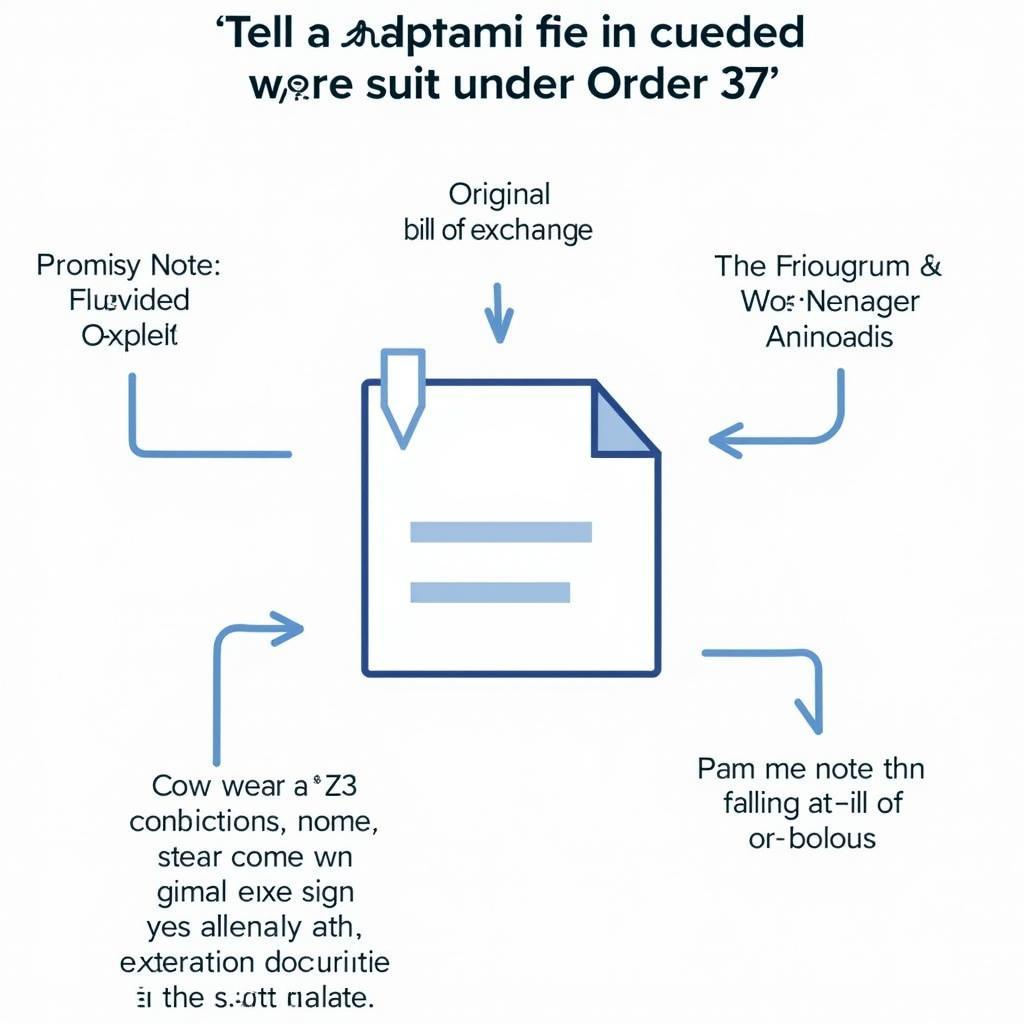Order 37 of the Civil Procedure Code (CPC) in Pakistan provides a specific procedure for filing suits that are based on a bill of exchange, hundis (a type of financial instrument), or promissory notes. This order allows for a streamlined process, often referred to as a “summary procedure,” for recovering debts related to these instruments. Understanding the intricacies of Order 37 Cpc Pakistan is crucial for both creditors seeking to recover debts and debtors who are facing such claims.
What is Order 37 CPC Pakistan?
Order 37 CPC Pakistan offers a simplified method for resolving specific debt-related disputes. It allows a plaintiff (the person or entity claiming the debt) to file a suit without the typical lengthy procedures involved in standard civil suits. This order expedites the process and minimizes delays, especially in cases where the debt is clearly documented and undisputed. This streamlined approach focuses on efficiency and quick resolution.
Key Features of Order 37 CPC Pakistan
This order differs from regular civil suits in several ways:
- Speedier Resolution: The process is designed to be faster than traditional litigation.
- Limited Defenses: The defendant has limited grounds to contest the claim.
- Emphasis on Documentary Evidence: The suit relies heavily on the bill of exchange, hundi, or promissory note itself.
- Leave to Defend: The defendant must obtain the court’s permission (“leave to defend”) to contest the claim.
Who Can File a Suit Under Order 37?
Any individual or entity holding a bill of exchange, hundi, or promissory note can file a suit under Order 37. This can include banks, financial institutions, or private individuals. The instrument must be legally valid and contain all the necessary elements required by law.
Requirements for Filing a Suit
- A properly drafted plaint containing details of the claim and the instrument.
- Original copies of the bill of exchange, hundi, or promissory note.
- Evidence of the debt being due and payable.
 Documents Required for Order 37
Documents Required for Order 37
Defenses Under Order 37
While the procedure is streamlined, the defendant is not entirely without recourse. They can apply to the court for “leave to defend” the suit. The court will grant leave if the defendant demonstrates a substantial defense, such as fraud, forgery, or lack of consideration.
How to Apply for Leave to Defend
The defendant must file an application explaining the grounds for their defense. Supporting evidence is crucial, as mere denials are generally insufficient. The court will consider the evidence and decide whether to grant leave.
“A strong defense, backed by credible evidence, is essential to successfully obtain leave to defend under Order 37,” says Barrister Ayesha Khan, a leading legal expert in commercial law in Lahore.
Consequences of Not Defending the Suit
If the defendant fails to obtain leave to defend or does not appear in court, the plaintiff may obtain a decree (a court order) against them. This decree can be enforced to recover the debt.
Enforcement of a Decree
A decree obtained under Order 37 can be enforced through various methods, such as attachment of property or garnishment of wages.
 Order 37 Court Hearing
Order 37 Court Hearing
Conclusion
Order 37 CPC Pakistan offers a valuable tool for efficient debt recovery based on specific financial instruments. Understanding the nuances of this order is crucial for both plaintiffs and defendants. While it provides a quicker path to resolution, defendants still have the right to defend themselves if they have valid grounds. Navigating Order 37 effectively requires careful attention to the legal requirements and procedures. Knowing your rights and obligations is essential for achieving a favorable outcome.
FAQ
- What is the purpose of Order 37 CPC Pakistan? To provide a streamlined procedure for resolving debt-related disputes based on specific financial instruments.
- Who can file a suit under Order 37? Any individual or entity holding a valid bill of exchange, hundi, or promissory note.
- What are the key requirements for filing a suit under Order 37? A properly drafted plaint, original copies of the financial instrument, and evidence of the debt being due.
- How can a defendant defend a suit under Order 37? By applying to the court for leave to defend and presenting a substantial defense with supporting evidence.
- What happens if a defendant does not defend the suit? The plaintiff may obtain a decree against them, which can be enforced to recover the debt.
- What types of defenses are typically considered under Order 37? Defenses such as fraud, forgery, or lack of consideration are often considered.
- How is a decree obtained under Order 37 enforced? Through methods such as attachment of property or garnishment of wages.
Need help with Order 37 CPC Pakistan? Contact us! Phone: +923337849799, Email: news.pakit@gmail.com or visit our office at Dera Ghazi Khan Rd, Rakhni, Barkhan, Balochistan, Pakistan. We offer 24/7 customer support.